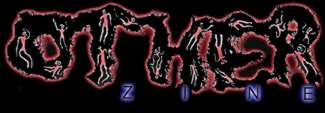
Medical Madness: Pain, Choking, and Enemas
by Noel Lawrence
Click here for printable version
For most filmgoers, a Saturday evening of medical documentaries would have about the same appeal as a plain saltine. Words like "dry", "scientific", and "logical" usually go hand-in-hand with films on pain management, congestive heart failure, CPR, and other maladies. However, beneath the predictable morass of academic titles lies a treasure trove of films that deal with their technical subject matter in an unconventional manner.
Presented by San Francisco’s underground Other Cinema, "Medical Madness" takes the viewer on a fantastic voyage into this under-appreciated realm. Consider the 1962 film Pain and Its Alleviation. A doctor and nurse cart a patient on a gurney to the ER. The corridor is gaudily illuminated in saturated shades of red and purple, more akin to a horror film set than an actual hospital. Like any garden-variety thriller, a heartbeat thumps loudly on the soundtrack to convey the tension of the moment.
"Do something!" cries the patient.
"Almost completely severed," muses the doctor over a bloody limb, mercifully kept off screen.
"Can you save it, doctor?" he asks.
"If we're both extremely lucky."
The gurney turns the corner.
"No, doctor! No, not that!"
A horrific scream sounds off camera and the film ends abruptly.
Such a dark ending for a film was uncommon in 1962. That this ending is part of an educational film is astounding. Yet, again and again, Pain manifests the tendencies of a suspense film. Bursts of red flash across the screen (á la Hitchcock's Marnie), punctuated by wailing bebop jazz. Overblown, dramatic narration accompanies the score: "Pain is a mysterious monster that lurks in the darkness of the unknowing." Notably, Igo Kantor, a collaborator of Ed Wood, Russ Meyer, and other B-movie directors, edited the film.
 More
recently, Abel Klainbaum's 2002 The History of Choking with Erick Estrada
(Yes, that is the real title) violates documentary conventions in a more
self-conscious manner. Choking combines a history of the Heimlich maneuver,
including real interviews with Dr. Henry J. Heimlich, with bizarre narration,
goofy reenactments, and intentionally clumsy editing. In Klainbaum’s strange
universe, choking actors turn ridiculous shades of blue, a quotation from
C. Everett Koop is read with a cockney accent, and a moped-riding man
named Erick Estrada (no apparent relation to the TV star) inexplicably
introduces and concludes the video. Despite Choking's non-standard approach
to the educational documentary format, “the film is a must,” as the Florida-based
filmmaker explains, “if you eat or know someone who eats.”
More
recently, Abel Klainbaum's 2002 The History of Choking with Erick Estrada
(Yes, that is the real title) violates documentary conventions in a more
self-conscious manner. Choking combines a history of the Heimlich maneuver,
including real interviews with Dr. Henry J. Heimlich, with bizarre narration,
goofy reenactments, and intentionally clumsy editing. In Klainbaum’s strange
universe, choking actors turn ridiculous shades of blue, a quotation from
C. Everett Koop is read with a cockney accent, and a moped-riding man
named Erick Estrada (no apparent relation to the TV star) inexplicably
introduces and concludes the video. Despite Choking's non-standard approach
to the educational documentary format, “the film is a must,” as the Florida-based
filmmaker explains, “if you eat or know someone who eats.”
What lifts Abel Klainbaum’s documentary above mere farce is its ability to convey a substantial amount of important information in a memorable way. Did you know choking is the sixth leading cause of accidental death in the United States? Did you know that Dr. Heimlich has been credited with saving more lives than any other living person? Or that it is dangerous to eat peanut butter directly off the spoon? All these facts and more are imparted in Klainbaum’s half-hour docu-comedy.
"Medical Madness" also features a number of rare shorts from San Francisco's Oddball Film and Video Archive. Among these curios, Other Cinema presents the U.S. Army's How to Give an Enema, a detailed instructional film to assist soldiers on performing that unpleasant yet necessary duty. Not for the squeamish, the Mayo Clinic's Ocular Biomicroscopy is a real-life shocker about eye surgery, easily out-pacing the grisliest moments of David Cronenberg's Videodrome or Lucio Fulci's The Beyond.
 No
screening at Other Cinema is complete without a segment of expanded cinema.
In this case, San Francisco filmmaker Kerry Laitala presents Breathing
for Others, a live triple-projection of medical films which constitute,
according to the filmmaker, "a first-aid manual written under the
guidance of the Marquis de Sade." Laitala also presents her new short
film Out of the Ether, "musings about fear in the guise of
microbial menace and mayhem." Ether also screened at the San
Francisco International Film Festival this spring.
No
screening at Other Cinema is complete without a segment of expanded cinema.
In this case, San Francisco filmmaker Kerry Laitala presents Breathing
for Others, a live triple-projection of medical films which constitute,
according to the filmmaker, "a first-aid manual written under the
guidance of the Marquis de Sade." Laitala also presents her new short
film Out of the Ether, "musings about fear in the guise of
microbial menace and mayhem." Ether also screened at the San
Francisco International Film Festival this spring.
Like many previous curated shows at Other Cinema, "Medical Madness" presents a diverse range of film and video works with an eye both to past and present—the experimental practices of educational film and the educational practices of experimental film.